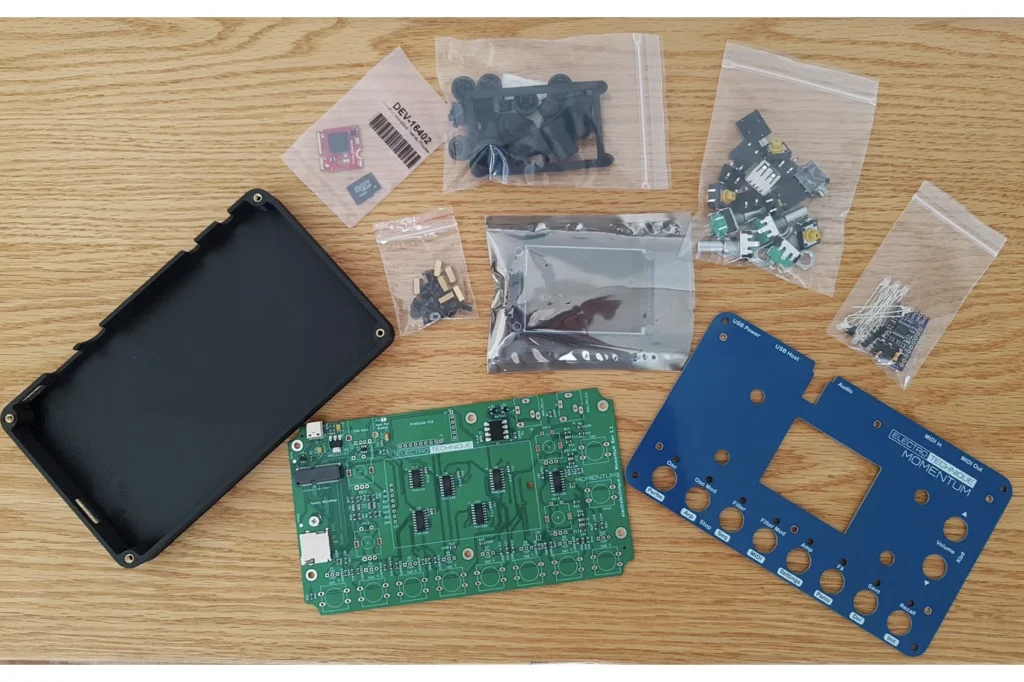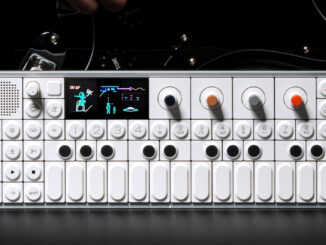Electrotechnique, the maker of the TSYNTH, returns with the Momentum, a new affordable DIY 12-voice digital polyphonic Synthesizer.
In 2020, the South Korean developer Electrotechnique published the TSYNTH, a fascinating open-source digital Synthesizer. This is based on a Teensy and costs around $99 to build yourself. For a 12-voice poly synth, a steal. No wonder the synth became a massive DIY hit and was constantly sold out. Meanwhile, the situation is better, and you can buy it at various DIY shops.
Three years after his super hit, Electrotechnique returns with a new synth. It’s again digital, teensy-based, open-source, and is called Momentum.
Open-source & DIY
Like TSYNTH, Momentum is open-source, and the code is available for download. It’s also based on a Teensy again. You can buy it as a DIY kit or already assembled. Below, you can see the kit version.
According to Electrotechnique, the Momentum is easier to build than TSYNTH and has a simpler case consisting of a 3D printed tray and a PCB front panel. The complete DIY kit gives you everything you need to build the synth: PCB, front panel, case, the Teensy, knobs, etc.
Electrotechnique Momentum
Now, the hard facts. Momentum is a 12-voice digital virtual analog polyphonic Synthesizer that builds on the TSYNTH, the developer’s first synth. This synth is, however, not a simple 1-to-1 remake of the TSYNTH. It’s a new synth with new features.
On the engine side, you get two digital oscillators with classic waves, a state variable filter per voice, two envelopes (filter, amp), and an LFO. Plus, you get a stereo ensemble and reverb effects to refine your sounds. There is also velocity available.
A very straightforward and classic feature set from the sound engine. Since the synth is open-source, the developer invites others to add new features. So it can still grow and could become a more powerful synth.
Momentum comes with 8 user banks with 128 patches which are recallable via MIDI. Plus, there are 128 performance slots where you can store your patch with mapped parameters.
The synth has a stereo analog audio path with a single stereo socket output and can transmit audio over USB in 16bit 44.1kHz. That’s an excellent addition.
On the back, you get a MIDI interface with in/out or thru with filtering on minijack (A and B type), stereo output on minjack, and two USB sockets. The first is a classic USB-MIDI port while the other is a USB Host, allowing you to connect your favorite MIDI controller just with a USB cable.
Arpeggiator and Sequencer
Further, Momentum features a built-in sequencer with up to 64 steps and 128 sequencer preset slots. Next to this, you also get an arpeggiator with six styles, range control, base octave, and tempo divisions.
Operation
The synth is operated with four encoders, ten buttons, and a display. The buttons can be used to navigate through the menus. In the so-called performance patches, parameters can be mapped to the encoders, giving you quick access to them. So it’s a bit like macro controls.
Thus the Momentum is much more menu-heavy than the TSYNTH, which scored particularly well with its flat menu structure and many knobs. 8 of the 10 buttons also form a simple 8-note polyphonic keyboard with scale and octave choice.
First Impression
Momentum looks very interesting. It’s a pity that the synth has fewer controls than Electrotechnique’s first DIY synth. In addition, the engine is currently a bit weak. I hope the open-source community will take it to the next level. But otherwise an exciting new synth. It’s nice that the developer implemented USB host functionality.
Electrotechnique Momentum is available now at Tindie in three configurations. The DIY kit without the Teensy Micromod for $199, with Teensy + microSD for $238, and assembled for $285.
More information here: Tindie







Be the first to comment